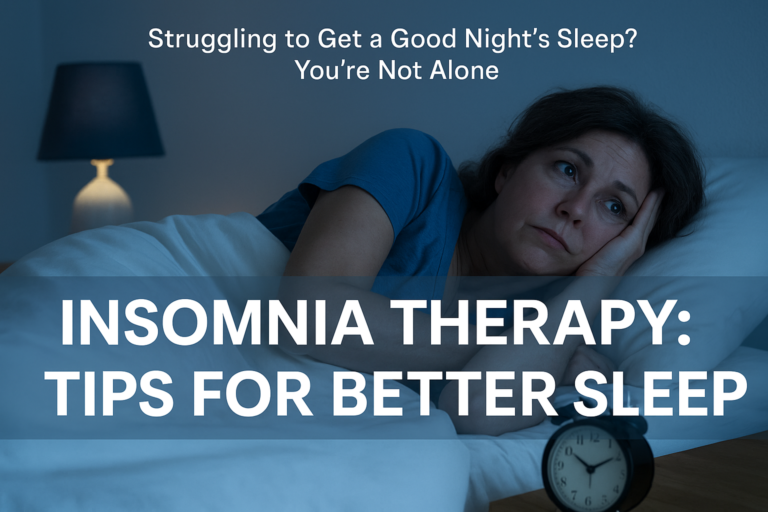Struggling to Get a Good Night’s Sleep? You’re Not Alone.
If you find yourself staring at the ceiling night after night, you’re in good company. Insomnia affects nearly 1 in 3 adults, especially those between the ages of 40 and 70. Hormonal changes, stress, lifestyle habits, and even certain medications can all mess with your sleep. But here’s the good news: there are things you can do to improve it.
This post will walk you through simple, practical insomnia therapy tips you can try starting tonight.
What Exactly Is Insomnia?
Insomnia isn’t just tossing and turning once in a while. It’s when trouble falling asleep, staying asleep, or waking too early becomes a regular thing—at least 3 nights a week for several weeks. And the result? Fatigue, mood swings, difficulty concentrating, and a general feeling of “blah” throughout your day.
1. Create a Sleep-Friendly Environment
Your bedroom should be your sleep sanctuary. Here’s how to make it just that:
- Cool it down: The ideal sleep temperature is between 60–67°F (15–19°C).
- Keep it dark: Blackout curtains or a good sleep mask can help.
- Reduce noise: Use white noise machines, earplugs, or even a fan.
- Declutter: A tidy room promotes a calmer mind.
Bonus tip: reserve your bed for sleep and intimacy only. No phones, no laptops, no Netflix.
2. Stick to a Routine
Your body loves routine—even if your schedule doesn’t. Try going to bed and waking up at the same time every day, even on weekends.
Why? A consistent routine resets your circadian rhythm (your internal body clock), making it easier to fall asleep naturally.
3. Watch What You Eat (and Drink)
Some foods and drinks can seriously mess with your sleep.
- Caffeine: Avoid coffee, tea, soda, and even dark chocolate after 2 PM.
- Alcohol: It might help you doze off, but it disrupts deep sleep cycles.
- Heavy meals: Eating large meals late at night can cause indigestion and keep you awake.
- Late-night snacking? Try a light snack like a banana, a handful of almonds, or warm milk.
4. Get Moving—But Not Right Before Bed
Regular physical activity helps regulate your sleep, but timing matters. Aim for at least 30 minutes of moderate exercise most days of the week—but try to finish your workout at least 3 hours before bedtime.
Walking, swimming, yoga, or even dancing in your living room count.
5. Wind Down With a Pre-Bed Routine
Help your body shift into sleep mode with a relaxing bedtime ritual:
- Read a book
- Take a warm bath
- Do some gentle stretches or deep breathing
- Listen to calming music
- Try guided meditation or sleep stories
Avoid screen time (phones, tablets, TVs) at least 1 hour before bed. Blue light from screens tricks your brain into staying alert.
6. Consider Cognitive Behavioral Therapy for Insomnia (CBT-I)
This is one of the most effective, drug-free insomnia therapies out there. CBT-I helps you understand and change negative thoughts and behaviors that sabotage your sleep.
You can find licensed therapists who specialize in CBT-I, or use online platforms and apps (like Sleepio or CBT-i Coach) if you prefer something digital.
7. Talk to Your Doctor
Sometimes, sleep issues are linked to underlying health conditions like:
- Sleep apnea
- Restless legs syndrome
- Chronic pain
- Anxiety or depression
- Hormonal imbalances (especially during menopause)
If insomnia lasts more than a few weeks or starts affecting your quality of life, don’t hesitate to talk to your doctor. They may suggest treatments, recommend a sleep study, or adjust your medications.
8. Try Natural Sleep Aids (Cautiously)
Some people find relief with natural remedies, such as:
- Melatonin: A hormone your body produces naturally. Short-term use can be helpful.
- Magnesium: Supports deep, restful sleep.
- Valerian root or chamomile tea: Calming herbs with gentle sedative effects.
- Lavender essential oil: Add a few drops to your pillow or diffuser.
Always check with your healthcare provider before starting any new supplements.
Final Thoughts: Small Changes Can Make a Big Difference
Insomnia isn’t something you have to just live with. While there’s no one-size-fits-all fix, combining several of these strategies can gradually lead to better, deeper sleep.
Start small. Pick one or two tips that resonate with you and build from there.
And remember—better sleep isn’t a luxury, it’s a necessity. You deserve to wake up feeling rested and ready to enjoy life, every single day.
